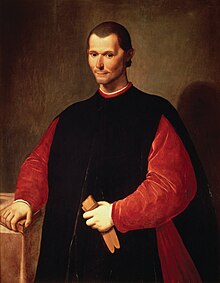
Back Realisme (internasionale betrekkinge) Afrikaans نظرية الواقعية السياسية Arabic Realizm (beynəlxalq münasibətlər) Azerbaijani Реализъм (политология) Bulgarian রাজনৈতিক বাস্তবতাবাদ Bengali/Bangla Realisme polític Catalan Realismus (mezinárodní vztahy) Czech Realaeth (damcaniaeth cysylltiadau rhyngwladol) Welsh Realisme (international politik) Danish Realismus (Internationale Beziehungen) German

Realism, a school of thought in international relations theory, is a theoretical framework that views world politics as an enduring competition among self-interested states vying for power and positioning within an anarchic global system devoid of a centralized authority. It centers on states as rational primary actors navigating a system shaped by power politics, national interest, and a pursuit of security and self-preservation.[1][2]
Realism involves the strategic use of military force and alliances to boost global influence while maintaining a balance of power. War is seen as an inevitability inherent in the anarchic conditions of world politics. Realism also emphasizes the complex dynamics of the security dilemma, where actions taken for security reasons can unintentionally lead to tensions between states.[1]
Unlike idealism or liberalism, realism underscores the competitive and conflictual nature of global politics. In contrast to liberalism, which champions cooperation, realism asserts that the dynamics of the international arena revolve around states actively advancing national interests and prioritizing security. While idealism leans towards cooperation and ethical considerations, realism argues that states operate in a realm devoid of inherent justice, where ethical norms may not apply.[1]
Early popular proponents of realism included Thucydides (5th century BCE), Machiavelli (16th century), Hobbes (17th century), and Rousseau (18th century).[3] Carl von Clausewitz (early 19th century), another contributor to the realist school of thought, viewed war as an act of statecraft and gave strong emphasis on hard power. Clausewitz felt that armed conflict was inherently one-sided, where typically only one victor can emerge between two parties, with no peace.[4]
Realism became popular again in the 1930s, during the Great Depression. At that time, it polemicized with the progressive, reformist optimism associated with liberal internationalists like U.S. President Woodrow Wilson.[1] The 20th century brand of classical realism, exemplified by theorists such as Reinhold Niebuhr and Hans Morgenthau, has evolved into neorealism—a more scientifically oriented approach to the study of international relations developed during the latter half of the Cold War.[1] In the 21st century, realism has experienced a resurgence, fueled by escalating tensions among world powers. Some of the most influential proponents of political realism today are John Mearsheimer and Stephen Walt.[citation needed]
- ^ a b c d e Devetak, Richard, ed. (2012). An introduction to international relations (2nd ed.). Cambridge: Cambridge University Press. pp. 36–41. ISBN 978-1-107-60000-3.
- ^ Blanton, Shannon Lindsey; Kegley, Charles William (2017). World Politics: Trend and Transformation (2016–2017 ed.). Boston, MA: Cengage Learning. p. 24. ISBN 978-1-305-50487-5.
- ^ Jahn, Beate, ed. (2006). Classical theory in international relations. Cambridge studies in international relations. Cambridge: Cambridge Univ. Press. p. 7. ISBN 978-0-521-68602-0.
- ^ Creswell, Michael (2019-04-17). "Was Clausewitz a Realist? If So, What Kind?". E-International Relations. Retrieved 2024-02-14.